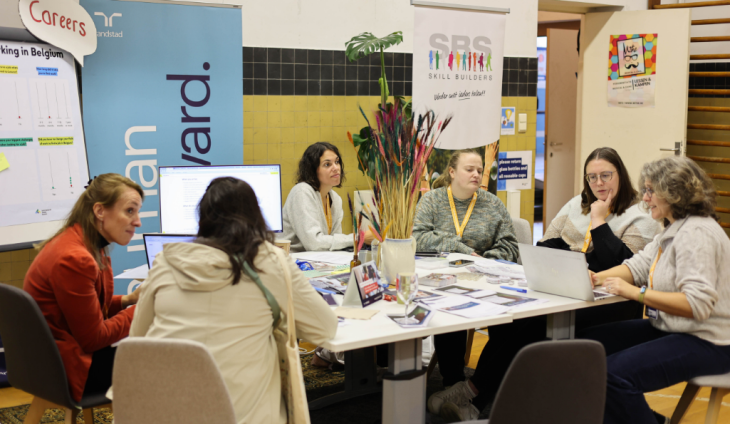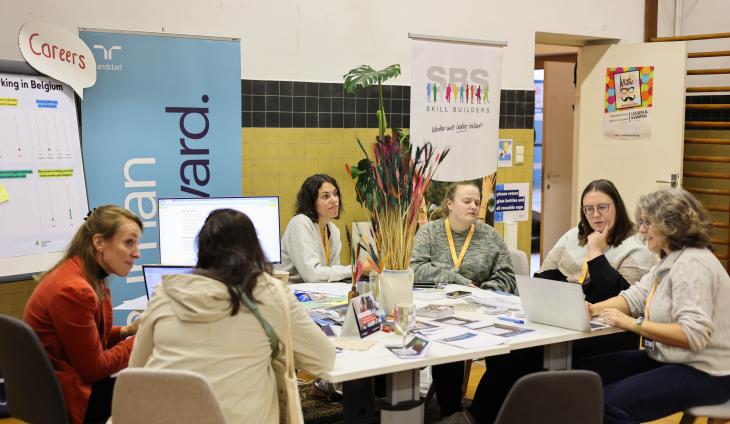Meet the Panel
Marie-Aimée Ishimwe is a policy advisor specializing in higher education. With experience spanning eight countries, she brings a global, intercultural, feminist, and anti-racist perspective to social justice issues in higher education, public policy, health, and arts and culture. Beyond her policy work, she is also a Freelance HR Consultant for international professionals, offering job search coaching, CV and cover letter workshops, and Q&A sessions to support career development.
Charlot Van Parijs, Sales Director at CTRL-F, brings over a decade of recruitment experience, specializing in engineering, finance, logistics, and sales & marketing profiles. Her career at the House of HR has made her well-versed in international hiring.
Griet Schotsmans serves as the Country HR Manager at Siemens Industry Software. Working for a multinational company with 36 different nationalities represented, Schotsmans has a strong background in hiring talent abroad, especially engineers.
Geert Mortier, founder of a Leuven-based IT company, heads the human resources department at his company, as well as freelancing for several technology companies. Having recently started sponsoring international candidates, he brings a fresh take on smaller-scale hiring dynamics, including how small businesses navigate permitting and bureaucracy.
Job Application Materials
When submitting documents for a job application, there was a strong consensus emphasized: customize your cover letter. Opinions varied in the session on whether resumes should be tailored per role, but all agreed that the cover letter must be catered toward the job description. As soon as a cover letter opens with “To Whom It May Concerns,” the panel said that most hiring teams disregard it. The panel urged candidates to do their homework— understand the company, highlight relevant skills, and personalize it. The cover letter should ideally be around 3-5 paragraphs. Go beyond that, and you likely lose them; hiring managers spend around 7 seconds on each candidate in the first stage.
This doesn’t mean you have to start from scratch for every job application. You can take a general mold, including your experience and education, then tailor it to the job description. However, the motivation for applying to a specific company and role should be modified in the cover letter.
A key tip from the panelists was that candidates should mention skills from the job posting on your resume or cover letter, such as time management, team leadership, or multi-tasking. Schotsmans noted that some companies are using AI to scan for keywords in resumes and cover letters from applications. “If there's no match with the content of the job and the written cover letter, AI puts you on the side.” AI is more commonly used in the beginning rounds of hiring when companies need to scan through potentially thousands of applicants. The larger the company and demand for the job, the more likely AI will be the first reader of your application.
However, don’t withhold your application for a job because you don’t meet all of the hirers criteria. Job postings are often a wish list and not ultimatums; for example, Van Parijs says that, “even if a vacancy requires a language that you do not have, take a chance and prove that you are the right person for the job; we hire internationals without those language skills frequently.” If a job posting does require a skill you do not have, address the knowledge gap in your interview with an openness to learn.
Experience
One of the biggest obstacles for international candidates, especially young ones, is having the relevant work experience for a position. After a year of continuously applying to jobs, I can tell you that not having enough experience is the most common reason for rejection, particularly for recent graduates or those who have made a career transition. It can be incredibly frustrating when you're caught in a catch-22: you need experience to get a job, yet you need a job to get experience. Many jobs nowadays listed as entry-level require several years of experience.
If you’re looking for work in Belgium and remain on a student permit, the best piece of advice is to find an internship while you’re still completing an academic program. Some programs require this as a part of school curriculum, also called an apprenticeship. However, even if your program does not require an internship, I highly recommend finding one anyway (and yes, you are still eligible the summer after you graduate if you can’t squeeze it into your busy course load). Belgian companies rarely offer unpaid internships to non-students, as they are legally obliged to pay minimum wage. Student internships, however, offer a low-risk entry point for both sides.
Furthermore, internships are beneficial not simply for receiving the training and work experience on a CV, but because companies may offer interns full-time offers after their program. Interns are familiar with the duties, work culture, and co-workers. Internships serve as a great trial period to get your foot in the door and build your network. Plus, if a company is going to hire you as an international, it gives them extra time to start the onboarding and permitting process (which can take anywhere from 3-4 months).
Already graduated? All is not lost. There are other ways to gain experience without an offer for a salaried position. One of the more common ways is through freelancing, (if your field allows for it) which involves working independently as a form of self-employment. Most contracts are short-term and are quota based, and allow you to build your portfolio of work. Common fields for freelancing include photography, writing, social media, or consultancy.
Another option is to take on volunteer work. Some associations are eligible to hire volunteers, including schools, non-profits, or sports instruction. Volunteers can be compensated for expenses with a maximum of €42.31 per volunteer per day and a maximum of €1692.51 per volunteer per calendar year.
Integration
A unanimous point during this info-session was that companies value the effort you have put into making a life for yourself in Belgium, showing that, as Van Parijs said, you “have a willingness to be in Belgium.”
Schotsmans echoed this point: international candidates who have embraced Belgian culture while offering an international angle bring the best of both worlds.
Mortier, having experienced the sting of premature departures, looks closely at a candidate’s motivation for being in Belgium. “When [looking for candidates], I want to see your mindset about living in Belgium.” Candidates should answer the question: “why are you in Belgium?” in your cover letter.
While a dream position may be a strong reason for relocating, it shouldn’t be your only criteria. A candidate who is moving solely for the job can be a red flag for an employer, as they may not be prepared for the culture shocks of the region. Beyond scoring a job offer, work-life balance is crucial, and living in a place you enjoy is a key component to long-term satisfaction.
Larger, more international companies are usually more familiar with the process of sponsoring talent. Some of the panelists also mentioned that they find it easier to sponsor candidates who are already residing within Belgium on other permits, such as student or legal cohabitation visas. Not having a permit should not deter you from applying, as many companies are willing to learn the process for the right candidates.
An additional tip is to have potential employers you are interviewing with contact the International House Leuven if they have any questions about work permits for internationals. They are always happy to help explain the process and provide insight into the situation.
Bonus Tips
Here are some final extra tips given by the HR professionals:
- Referrals can give you a leg up: Some companies have a point system with a bonus for candidates who come in through a referral.
- Mind the gaps: In your cover letter, explain all of the career breaks in your resume.
- Make a strong elevator pitch: Sales pitch expert Rémy Van Haver uses the metaphor that a pitch is like a movie trailer: “it triggers the viewer to watch the entire movie after seeing the exciting bits and pieces.” Include where you’re from, what your passions are, and what you bring to the table or what problem you solve.
- Pivot Toward Your Strengths: Highlight your capabilities instead of focusing on your weakness. Reframe your areas of weakness or inexperience as a willingness to learn and adapt on the job.
If you are looking for other career support, check out the International House Leuven career workshops on their activities page. They often host events where you can brush up your CV, practice interviewing, learn how to navigate the Belgian job market and more. They also have an extensive information section on their website about working in Belgium.
Good luck out there, and happy job hunting!
This article was contributed by Colby Grey, a recent master’s student graduate from KU Leuven and a budding journalist from the United States who is currently on a search year permit.



